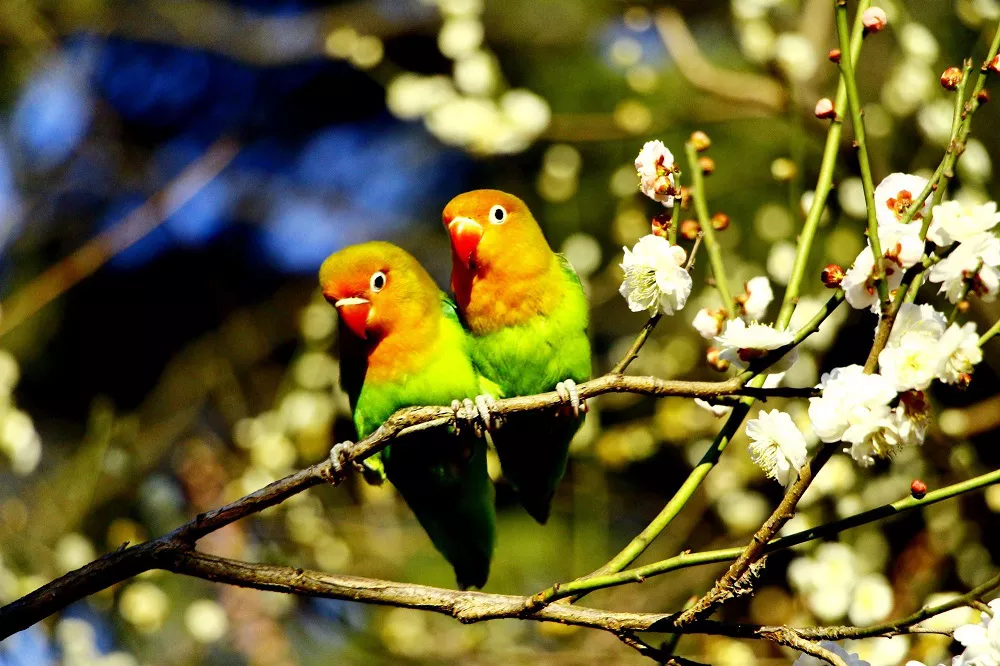Lovebirds are popular pet birds known for their colorful plumage, lively personalities, and social nature. As with any pet, it’s important to understand the average lifespan of lovebirds before bringing one into your home. In this article, we’ll explore how long lovebirds live, as well as factors that can influence their lifespan.
How Long Do Lovebirds Live?
The average lifespan of lovebirds is approximately 10 to 15 years, although some individuals may live longer. There are several different species of lovebirds, and each has a slightly different lifespan. Here is an overview of each species and their average lifespan:
Peach-faced Lovebird: This species is the most popular among pet lovers and has an average lifespan of 10-15 years.
Fischer’s Lovebird: Fischer’s lovebirds have a similar lifespan to peach-faced lovebirds, averaging between 10-15 years.
Yellow-collared lovebird: Yellow-collared lovebirds typically have a slightly shorter lifespan than other species, averaging between 8-12 years.
Lilian’s Lovebird: Lilian’s Lovebird also known as the Nyasa Lovebird, has a shorter lifespan than other species, living an average of 6-8 years.
Black-cheeked Lovebird: This species has an average lifespan of 10-15 years.
Red-headed Lovebird: Red-headed lovebirds have an average lifespan of 10-15 years.
Black-winged Lovebird: The Black-winged Lovebird (Agapornis taranta), also known as the Abyssinian Lovebird, has a similar lifespan to peach-faced and Fischer’s lovebirds, averaging between 10-15 years.
Madagascar Lovebird: Madagascar lovebirds have a longer lifespan than some other species, averaging between 15-20 years.
Black-collared lovebird: Black-collared lovebirds have a similar lifespan to peach-faced and Fischer’s lovebirds, averaging between 10-15 years.
However, The lifespan of lovebirds can vary depending on factors such as diet, exercise, genetics, and overall health.
Factors That Can Influence Lifespan
Diet: A well-balanced diet is essential for the health and longevity of lovebirds. A diet consisting of fresh fruits and vegetables, high-quality seed mix, and occasional treats such as millet spray can help to provide the necessary nutrients and energy for a lovebird to thrive.
Exercise: Lovebirds are active birds and require regular exercise to maintain their health and wellbeing. Providing toys, perches, and opportunities for flight and play can help to keep lovebirds mentally and physically stimulated.
Genetics: The genetics of a lovebird can play a role in their lifespan. Some species and individual birds may be more prone to certain health conditions or genetic abnormalities that can impact their lifespan.
Overall Health: Like all animals, lovebirds can be susceptible to a variety of health conditions such as infections, injuries, and disease. Regular veterinary check-ups and prompt treatment of any health issues can help to ensure the best possible outcome for your lovebird.
Environmental Factors: The environment in which a lovebird lives can also impact their lifespan. Factors such as temperature, humidity, and exposure to toxins or other harmful substances can all have an impact on the health and wellbeing of a lovebird.
Tips for Promoting a Long, Healthy Life for Your Lovebird
Provide a well-balanced diet consisting of fresh fruits and vegetables, high-quality seed mix, and occasional treats.
Ensure your lovebird gets regular exercise and mental stimulation through toys, perches, and opportunities for play and flight.
Schedule regular veterinary check-ups and promptly address any health issues that arise.
Keep your lovebird’s environment clean and free from harmful substances.
Provide your lovebird with companionship and social interaction, as lovebirds are social birds that thrive in pairs or groups.
Conclusion
Lovebirds can make wonderful, long-lived pets when provided with proper care and attention. While the average lifespan of lovebirds is approximately 10 to 15 years, factors such as diet, exercise, genetics, and overall health can all influence their lifespan. By providing a healthy and stimulating environment, regular veterinary care, and social interaction, you can help ensure your lovebird lives a long, happy, and healthy life.
Related Topics:
- What foods can Lovebirds not eat?
- Can Lovebirds Eat Tomatoes?
- 9 Most Popular Lovebirds & Breeds Introduced


 Facebook
Facebook  Instagram
Instagram  Youtube
Youtube 